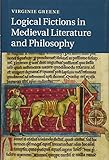Logical fictions in medieval literature and philosophy /
Material type: TextSeries: Cambridge studies in medieval literaturePublication details: New Delhi Cambridge University Press 2017Description: x, 293 pagesISBN:
TextSeries: Cambridge studies in medieval literaturePublication details: New Delhi Cambridge University Press 2017Description: x, 293 pagesISBN: - 9781107068742 (hardback)
- 302.23 GRE
| Item type | Current library | Collection | Call number | Status | Date due | Barcode | |
|---|---|---|---|---|---|---|---|
 Books
Books
|
Mahindra University VNLRC Reference | MT | 302.23 GRE (Browse shelf(Opens below)) | Available | 12411 |
Browsing Mahindra University VNLRC shelves, Shelving location: Reference Close shelf browser (Hides shelf browser)

|

|

|

|

|

|

|
||
| 302.23 GAM Heritage, sport and tourism | 302.23 GEH The "slumdog" phenomenon : | 302.23 GOR Saussure: for beginners | 302.23 GRE Logical fictions in medieval literature and philosophy / | 302.23 GUP My Favourite Levi-Strauss | 302.23 HAR The art of living : | 302.23 HAU Comparative politics : |
"In the twelfth and thirteenth centuries, new ways of storytelling and inventing fictions appeared in the French-speaking areas of Europe. This new art still influences our global culture of fiction. Virginie Greene explores the relationship between fiction and the development of neo-Aristotelian logic during this period through a close examination of seminal literary and philosophical texts by major medieval authors, such as Anselm of Canterbury, Abelard, and Chretien de Troyes. This study of Old French logical fictions encourages a broader theoretical reflection about fiction as a universal human trait and a defining element of the history of Western philosophy and literature. Additional close readings of classical Greek philosophers Plato and Aristotle, and modern analytic philosophy including the work of Bertrand Russell and Rudolf Carnap, demonstrate peculiar traits of Western rationalism and expose its ambivalent relationship to fiction"--
There are no comments on this title.

